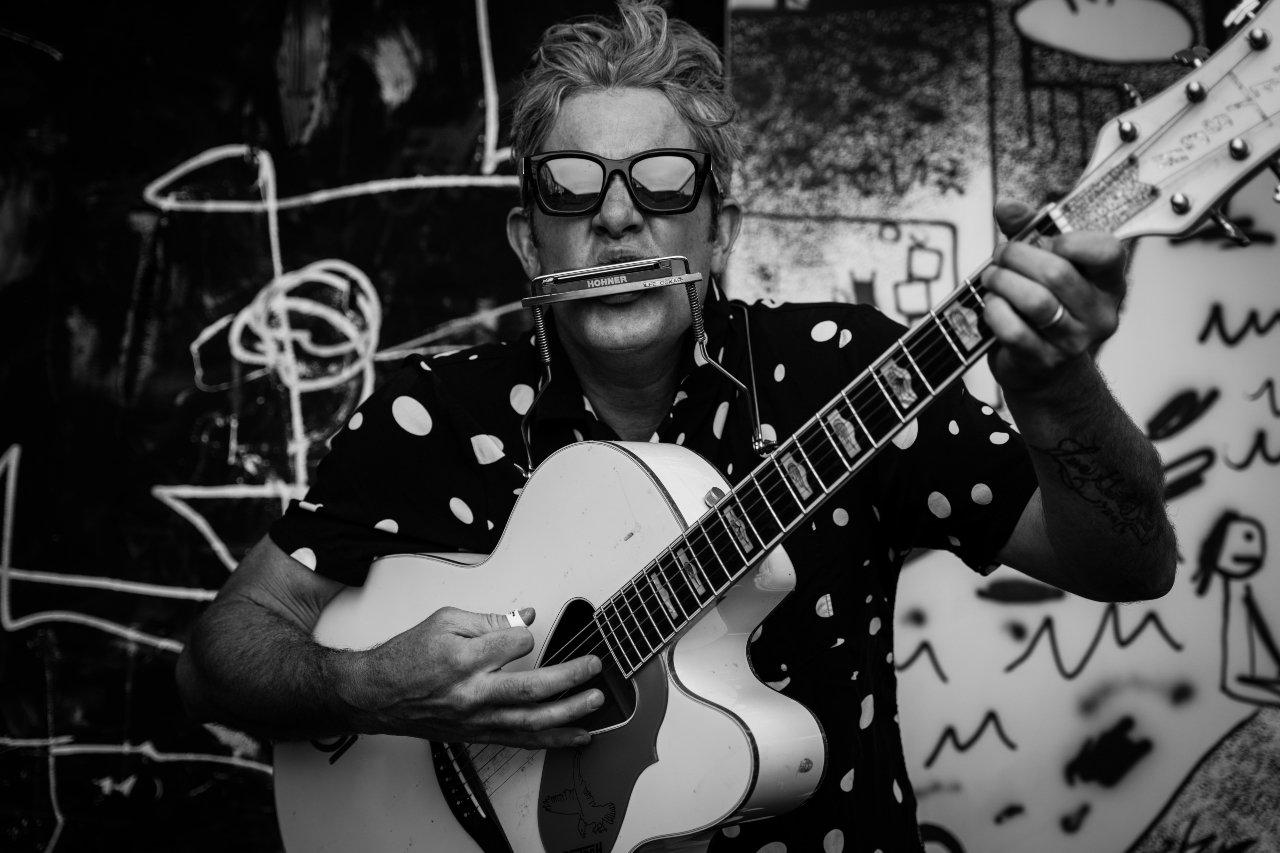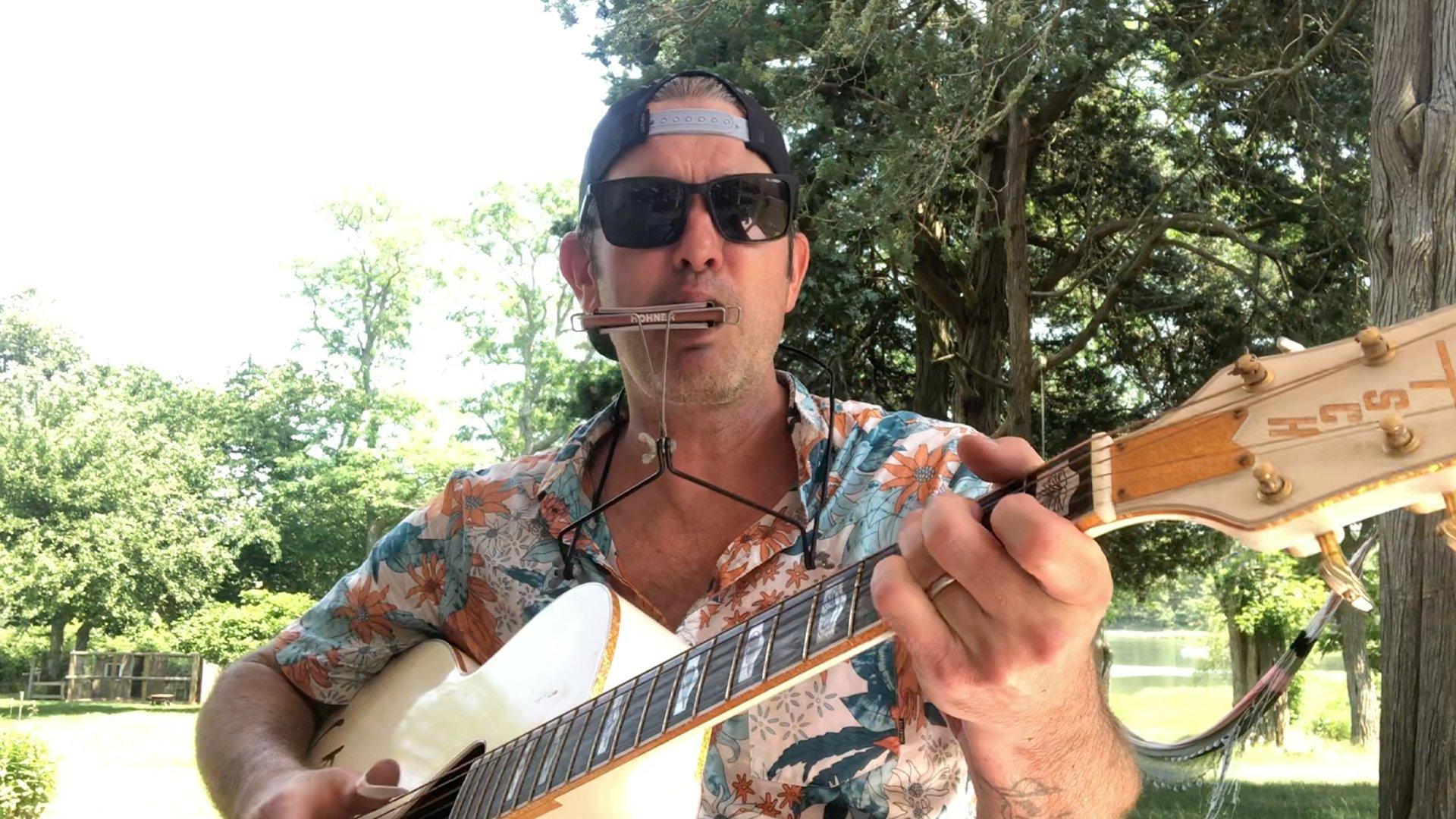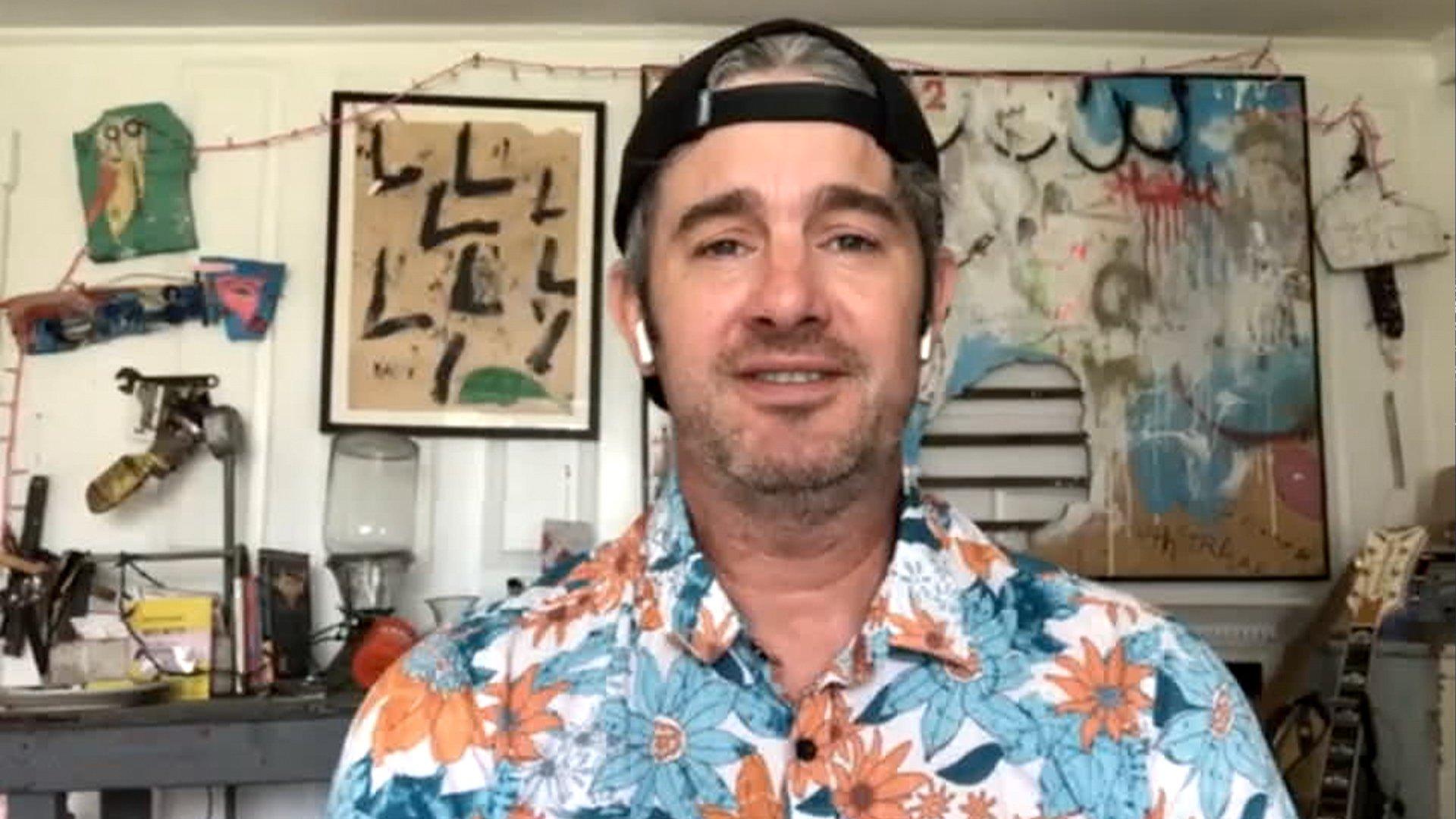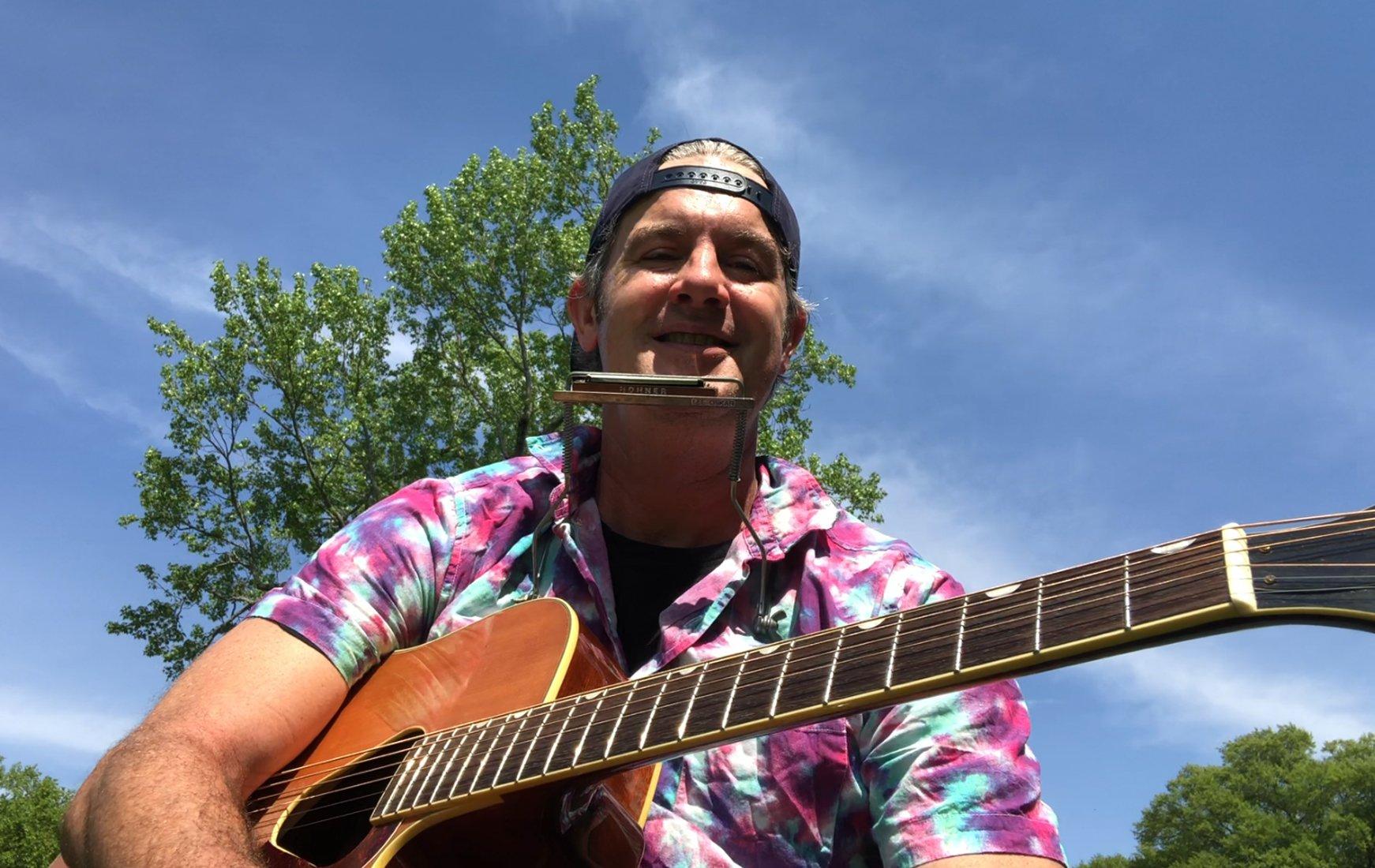Photo: Joe Navas

feature
G. Love On 'G. Love & Special Sauce' At 30: Revisiting A Classic Document Of The Hip-Hop Blues
G. Love and Special Sauce's self-titled debut hit the college charts hard with a dyad of party anthems, but there was so much more to it. Days before a reissue and supporting tour, G. Love revisits the band's origins, and how the album captured an era.
It's been decades since G. Love was a hip-hop-loving kid living with his parents in Philadelphia. But he kept their breakfast table.
Today, at his cozy-looking Cape Cod home, the artist born Garrett Dutton sits at that very table. Over Zoom, one also notices his conspicuous tattoos. Emblazoned on his left forearm is his seven-year-old's name and birthday; on his right, his three-year-old's. (His eldest is near the crook of his elbow; his two-year-old is pending.
The table and tats make this conversation about his debut album rather poignant. "These songs have given me everything that I love in life," he says of G. Love and Special Sauce's self-titled 1994 debut. "I wouldn't have met my wife if I wasn't a musician; I wouldn't have had my kids.
"Music has really given me everything in my life. In particular, this record," he continues. "So, I'm happy to have this milestone."
Naturally so: G. Love and Special Sauce kicked off a fruitful career in what he calls "the hip-hop blues." While both genres are offshoots of Black American music, with a plethora of common DNA, nobody combined them as Dutton did; strictly speaking, he might be the sole occupant of this lane.
At times, it's been a turbulent ride. Over the ensuing three decades, the music industry's fluctuated, and so have the college rock favorites' cachet — despite releasing albums easily of G. Love and Special Sauce's quality, like 1999's Philadelphonic and 2022's Philadelphia Mississippi. Recently, their drummer, Jeff "Houseman" Clemens, retired from the road.
But the genial, gracious Dutton stayed steady on the wheel. Sure, they're nothing if not idiosyncratic; Google their name and "laid-back" and see how many hits you get. But G. Love has managed to do what numberless acts can't: last.
Happily, in 2024, G. Love and Special Sauce are on an upswing. They remain a live favorite; the thirst for "Cold Beverage" and the rest is unabated. They've signed with new management, in Regime Music; perhaps that nudged them to put some muscle into G. Love and Special Sauce's 30th anniversary.
Indeed, a remastered G. Love and Special Sauce will be digitally re-released Jan. 12, with 11 intriguing live recordings from New York's Knitting Factory in 1994. The day before, the band will kick off a 41-date tour of North America, mostly playing cuts from the album. (Chuck Treece — who Dutton says has been a "ghost member" from the jump — will be behind the kit.)
G. Love and Special Sauce sneakily resonates in 2024 — and not just because it kicked off a career. The refrigerator-ready singles "Cold Beverage" and "Baby's Got Sauce" ruled the roost of college radio, but they're outliers, as hits tend to be: its spirit runs much deeper.
G. Love and Special Sauce is also something of a nexus: from here, you can go in so many directions — from alternative hip-hop to crackly Delta blues to peak 2000s sandals-core, like his longtime colleague Jack Johnson. Could this aesthetic resurge, like shoegaze or indie sleaze or Myspace emo? Revisit G. Love and Special Sauce, and you be the judge.
Back when Dutton's breakfast table sat in Philadelphia, the sounds of the Beastie Boys, Run-D.M.C., Eric B. and Rakim, LL Cool J, Boogie Down Productions, De La Soul, and A Tribe Called Quest lit up Dutton's dome.
"My generation was the first generation of kids to grow up as fans of hip-hop," Dutton explains. But being a practitioner seemed to be off the table.
"I definitely never thought about trying to be a rapper, because at that time, except for the Beastie Boys, Vanilla Ice, and 3rd Base, there were really not many white people rapping," he continues. "Because it was Black music that was coming out of the Black community, and it was so great that it took over the whole world, to where it is now — where it's part of the production on most records, of every genre."
Instead of rocking the mic, Dutton opted to strum an acoustic guitar, and be a folkie a la Bob Dylan. But then he discovered John Hammond, and that was his portal into the blues: Robert Johnson, Muddy Waters, Lightnin' Hopkins, other foundational figures.
As a street musician, Dutton rapped Eric B. and Rakim's "Paid in Full" over a blues riff. Eureka. "It was like the whole sky opened up and the light shined down on me and it was like, 'Oh, this is it,'" he recalls, still seeming in awe."
The band grew from there: at a solo performance in Boston, Dutton met Clemens, and later, bassist Jim "Jimi Jazz" Prescott. Their aesthetic developed around thrift-store polyester leisure suits, pawn-shopped guitars, and an antiquated, oversized kick drum.
"And I know that's where Jack White got his whole aesthetic," Dutton claims. "From seeing me play that pawn shop guitar — except he really dialed it in." (He remembers White rolling up to a Pontiac show that Kid Rock and the Black Crowes' late keyboardist, Eddie Harsch, attended.
Despite being signed to OKeh Records — a subsidiary of Epic — as a "developing artist," G. Love and Special Sauce seemed to arrive fully formed. With Boston as a new base, they caught flame instantly: Dutton describes their Monday night gigs at Irish pub the Plough and Stars as "euphoric… we were kind of blowing up on a local level in Boston."
When it came time to record their self-titled debut, the mission was simple: "We were trying to capture what we were doing live, which we were automatically addicted to."
The album's boomy, organic sound owes itself to minimal isolation, with bleed aplenty: Dutton sang and rapped into "some Italian funky mic I got at the cool music store, because I liked vintage-looking s—." (It's in the ballpark of a bullet mic, which harmonica players use; he fed it into an amplifier.)
"We were trying to capture the essence of the people that we loved, like John Lee Hooker, and Bob Dylan, and all the records that were made from the '40s through the '70s," Dutton says. "Performance records, capturing this amazing magic."
Other than "This Ain't Living," which features piano by mega-producer Scott Storch, and a guest appearance by the rapper Jasper, every note on G. Love and Special Sauce is by the core trio.
Despite its minimalism, G. Love and Special Sauce features a multiplicity of moods and shades. The hypnotic "Blues Music" is a mission statement; you want that mellow, loop-like groove to unspool for miles. "Garbage Man" features a stony Bonham-esque groove, with a gigantic kick drum sound and one of Dutton's darkest and most steely-eyed flows.
Highlights are all over the place: the grimy garage rock of "Fatman," the shimmering comedown that is "Some Peoples Like That," the solo valentine "I Love You." But, understandably, the label pushed the kegger-ready "Cold Beverage" and besotted brag "Baby's Got Sauce" first and foremost.
"Some of our more fun stuff," is how G. Love characterizes them. But that tune with Storch and Jasper comes to mind: "We should have come back for 'This Ain't Living,' which was a more social song about homelessness and steady living. It had more merit, maybe."
"Cold Beverage" and "Baby's Got Sauce" put G. Love and Special Sauce on the map, and also carved out their demographic. "We did get adopted by more of a party crowd," he says. "A lot of hipsters that would come to our shows kind of got turned off, maybe, by the college people."
As usual, Dutton flips a potential negative into a resounding positive. "You can't control your audience, and now our audience has kind of grown up with us," he says, noting that listeners who were kids in the mid-'90s are now bringing their kids to shows.
"That's what happens, and that's what you hope for," Dutton continues. "That your audience kind of stays with you, and you're part of their culture and their life."
As G. Love and Special Sauce gained steam on the live circuit, they also got pushback.
"People would ask, 'How can you be a white kid from Philadelphia and play the blues?'," he says. "But artists would never say that. Especially the first couple of years, we were doing shows with all my influences: Gang Starr, Jazzmatazz, De La Soul, f***ing Cypress Hill. No rappers were ever like, 'Oh, you suck,' or 'You can't do this.' Music was just music."
But by Dutton's telling, the live rap circuit ate the band alive. As he explains, G. Love and Special Sauce got thrown onto hip-hop bills with abandon, "even though we're more like a garage band that has hip-hop in our music."
When he was thrown on massive rap bills, "The crowds were really tough," he says.
"We're a three-piece garage band playing on either side of MC's rocking to decks. So they sound like they're at a club, just blasting, and we sound like this little rinky-dink unit."
Dutton was fed up with rap — so much so that he briefly threw it out. "I was like, "This is not what I'm trying to do. I want to play the blues.' Then that's why our second record was blues," he says. That album was 1995's Coast to Coast Motel; due to financial differences, the band reportedly almost broke up on its tour.
"I'd be the first to admit that it came in fully formed and it kind of unraveled as our influences diversified, and what we wanted to do artistically diversified, kind of lost the core of what we did," Dutton says. "But we came back to it; we came back to it."
If G. Love and Special Sauce come caked with unpleasant associations with frat parties and hackysack in the quad, give them another chance: G. Love's catalog with and without Special Sauce is mightily rewarding, as well as comforting.
One solo album from the aughts is called Lemonade, which leads us to one last tattoo.
"This is a funny story: I said, 'If I ever get a record deal, I'm going to get lemonade tattooed on my arm," he says, sans explanation. "The day that I got that, Jeff got a tattoo. We were staying at my parents' house in Philadelphia, and we came back to this kitchen table right here. We're looking sheepishly at each other, and we were like, 'I got a tattoo.' 'So did I!'"
Dutton has other musical outlets outside of Special Sauce, like his band, the Juice; his label, Philadelphonic Records; and his Outermost Roots & Blues Festival in Orleans, Massachusetts, on October 12. But with his long-running band, he just wants to keep going.
"Just to put on great shows and be happy," he says. "We have our health, and we have this great legacy of songs and albums, and we continue to make more." That is living.

G. Love
news
Press Play At Home: Watch G. Love Perform A Charming Version Of "She's The Rock"
In the newest episode of Press Play At Home, watch G. Love (of Special Sauce and the Juice fame) perform "She's the Rock" while surrounded by greenery
Last time GRAMMY.com heard from G. Love, he was joyously paying homage to Brittany Howard under a clear blue sky for the ReImagined At Home series.
And while any cover from the Special Sauce leader and the Juice frontman is bound to be interesting, the world originally fell in love with G. Love for his original tunes, like the ones on G. Love and Special Sauce (1994), Philadelphonic (1999) and The Juice (2020).
In the newest episode of Press Play At Home, watch a chilled-out G. Love strum and sing his rootsy 2020 track "She's the Rock," off The Juice, with a Gretsch and a harmonica on a similar patch of terra firma.
Check out G. Love's infectious performance above and enjoy more episodes of Press Play At Home.

G. Love
news
Herbal Tea & White Sofas: Watch G. Love Lay Out His Craft-Beer-Filled Tour Rider
In the newest episode of Herbal Tea & White Sofas, watch G. Love (of Special Sauce and the Juice fame) explain his tour rider—and why you can't leave him with a package of Nutter Butter backstage
As one of the world's foremost purveyors of the hip-hop blues, G. Love has many world-renowned abilities. Staying away from an available package of sandwich cookies is not one of them.
"I've come close to forbidding the peanut butter Nutter Butters," the Philly leader of Special Sauce and the Juice tells GRAMMY.com, with a laugh, in the latest episode of Herbal Tea & White Sofas. What he will abide, however, is local craft beer to support whatever city he's touring.
In the clip above, watch as G. Love explains his tour rider and tells GRAMMY.com how he and his band stay mentally centered before the stage lights flare up.
Check out the quirky clip above and click here to enjoy more episodes of Herbal Tea & White Sofas.
ReImagined At Home: G. Love Performs A Joyous Version Of Brittany Howard's "Stay High"

G. Love
news
ReImagined At Home: G. Love Performs A Joyous Version Of Brittany Howard's "Stay High"
In the latest episode of ReImagined At Home, G. Love (of Special Sauce fame) performs a soulful version of Brittany Howard's "Stay High," which won the 2020 GRAMMY for Best Rock Song
G. Love and Brittany Howard are rarely mentioned in the same breath, but they've contributed to American roots music in similar ways. While G. Love did so via his Philly junkyard-rap-blues aesthetic, Howard carved her place in the canon as part of the rock-and-soul band, Alabama Shakes.
Love and Howard now converge in the latest episode of ReImagined At Home. Under a clear blue sky, G. Love joyfully strums and wails Howard's hit, "Stay High," which won the 2020 GRAMMY for Best Rock Song. (It was also nominated for Best Rock Performance; in total, Howard has won five GRAMMYs and counts 16 total nominations.)
Watch the soulful and charmingly scrappy performance above and click here to enjoy more episodes of ReImagined At Home. Will Howard return the favor with a cover of "This Ain't Livin'" or "Milk and Cereal"? If so, GRAMMY.com will be here for it.
ReImagined At Home: Ryland James Performs A Commanding Version Of Hozier's "Take Me To Church"

Photo: Kevin C. Cox/Getty Images
news
2024 Paris Olympics Opening Ceremony: Watch Celine Dion, Lady Gaga, Gojira & More Perform
The Olympic Games have long featured iconic musical performances – and this year is no different. Check out the performers who took the stage in the City of Light during the 2024 Olympics Opening Ceremony in Paris.
The 2024 Paris Olympics came to life today as the Parade of Nations glided along the Seine River for the opening ceremony. The opening spectacular featured musical performances from Lady Gaga, Celine Dion, and more. Earlier in the week, some of music’s biggest names were also spotted in the city for the Olympics, including Olympics special correspondent Snoop Dogg, BTS' Jin, Pharrell Williams, Tyla, Rosalía, and Ariana Grande.
Read More: When The GRAMMYs & Olympics Align: 7 Times Music's Biggest Night Met Global Sports Glory
Below, see a full breakdown of some of the special musical moments from the 2024 Paris Olympics opening ceremony.
Lady Gaga
In a grand entrance, Lady Gaga emerged behind a heart-shaped plume of feathers on the golden steps of Square Barye, captivating the audience with her cover of the French classic "Mon truc en plumes." Accompanied by cabaret-style background dancers, she flawlessly belted out the song, executed impressive choreography, and even played the piano.
Lady Gaga’s connection to the song is notable, as Zizi Jeanmarie, the original artist, starred in Cole Porter’s musical "Anything Goes," which was Lady Gaga’s debut jazz release.
"Although I am not a French artist, I have always felt a very special connection with French people and singing French music — I wanted nothing more than to create a performance that would warm the heart of France, celebrate French art and music, and on such a momentous occasion remind everyone of one of the most magical cities on earth — Paris," Lady Gaga shared on Instagram.
Celine Dion
Closing out the ceremony with her first performance in four years since being diagnosed with stiff-person syndrome, Celine Dion delivered a stunning rendition of Edith Piaf’s everlasting classic, "L’Hymne à l’amour" from the Eiffel Tower. Her impressive vocals made it seem as though she had never left.
This performance marked Dion’s return to the Olympic stage; she previously performed "The Power of the Dream" with the Atlanta Symphony Orchestra and composer David Foster for the 1996 Olympics.
Axelle Saint-Cirel
Performing the National Anthem is no small feat, yet French mezzo-soprano Axelle Saint-Cirel knocked it out of the park.
Dressed in a French-flag-inspired Dior gown, she delivered a stunning rendition of "La Marseillaise" from the roof of the Grand Palais, infusing the patriotic anthem with her own contemporary twist.
With the stirring lyrics, "To arms, citizens! Form your battalions. Let’s march, let’s march," Saint-Cirel brought the spirit of patriotism resonated powerfully throughout the city.
Gojira
Making history as the first metal band to perform at the Olympics Opening Ceremony is just one way Gojira made their mark at the event.
The French band took the stage at the Conciergerie, a historic site that once housed French kings during medieval times and later became a prison during the French Revolution, famously detaining Marie Antoinette – Creating a monumental moment as the first metal band to perform at the ceremony, but also stirring the pot as they used the chance to nod toward politics.
Performing a revamped version of "Ah! Ça Ira," an anthem that grew popular during the French Revolution, the artists aren’t new to using their songs as a vehicle for political messages. The GRAMMY-nominated group are outspoken about issues concerning the environment, particularly with their song, "Amazonia," which called out the climate crisis in the Amazon Rainforest. Using music to spread awareness about political issues is about as metal as it gets.
Aya Nakamura
Currently France’s most-streamed musician, Aya Nakamura went for gold in a striking metallic outfit as she took the stage alongside members of the French Republican Guard. As there were showstopping, blazing fireworks going off behind her, she performed two of her own hit songs, "Pookie" and "Djadja," then followed with renditions of Charles Aznavour’s "For Me Formidable" and "La Bohème."
Although there was backlash regarding Nakamura’s suitability for performing at the ceremony, French President Emmanuel Macron dismissed the criticism. "She speaks to a good number of our fellow citizens and I think she is absolutely in her rightful place in an opening or closing ceremony," Macron told the Guardian.
Latest News & Exclusive Videos

2024 Paris Olympics Opening Ceremony: Watch Celine Dion, Lady Gaga, Gojira & More Perform

Ice Spice Is The Drill Queen On 'Y2K!': 5 Takeaways From Her Debut Album

New Music Friday: Listen To New Songs From Halsey, MGK And Jelly Roll, XG & More

Watch Young MC Win Best Rap Performance In 1990

The Red Clay Strays Offer A New Kind Of Religion With 'Made By These Moments'
